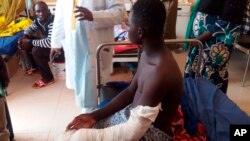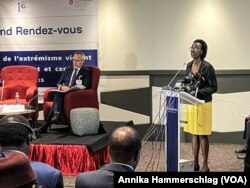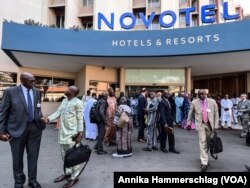Security experts are meeting this week in Senegal to discuss the fight against rising violent extremism in Africa, particularly in the Sahel region, where Islamist militant attacks are increasing at an alarming rate.
Over the last decade, an abundance of resources in the form of military personnel and dollars have poured into the fight against militant violence in Africa. Scores of conferences, forums and training exercises have been held to discuss causes and solutions.
The problem has not only persisted but has gotten worse.
Deaths linked to Islamist militants on the continent skyrocketed by nearly 50 percent in the last year to more than 19,000 people, much of it in the western Sahel region, according to the Africa Center for Strategic Studies. The violence has also expanded geographically, trickling into new regions, such as West African coastal states and the Lake Chad Basin.
“It is no secret that the security situation in West and Central Africa continues to deteriorate,” said Giovanie Biha, head of the United Nations Office for West Africa and the Sahel, in a speech that kicked off the meeting. “Terrorist groups continue to exploit the multifaceted challenges facing the region, notably its environmental, political and socioeconomic weaknesses and inequalities.”
“A regional challenge demands a regional response,” she added. “It has been proven that no country can effectively combat violent extremism and terrorism alone.”
In 2015, the United Nations launched the Prevention of Violent Extremism program to counter militant violence. This week’s meeting will examine that plan and determine how individual regions and states can better implement its strategies.
The meeting is being organized by the U.N. Office for West Africa and the Sahel, the Swiss Federal Department of Foreign Affairs and Senegal’s Center for Advanced Studies in Defense and Security.
Albert Kan-Dapaah is the minister of national security in Ghana. He says it is the only West African coastal state that has not recorded any extremist attacks.
Though Kan-Dapaah admits he can’t be sure why Ghana has managed to elude violence, he said the country implemented a national framework based on the U.N. plan after it was released.
“[A country’s response] should not be something that is exclusive to the government in power – it never works,” Kan-Dapaah said in a speech at the conference. “You need to involve the minority parties, you need to involve the civil society organizations, you need to involve women organizations and also the youth.”
Part of Ghana’s effort to prevent attacks involved supplying communities that were vulnerable to radicalization with resources such as potable water, schools and clinics, Kan-Dapaah said.
A report released last month by the U.N. Development Program found that 25 percent of people who’ve joined terrorist groups in sub-Saharan Africa did so primarily out of the need for employment – nearly quadruple the number who did so in 2017. Those citing religion as the main reason decreased by 57 percent to just 17 percent of recruits.
“Each state has their own individual strategy and solution to a transnational problem. But in the fight against terrorism you need to forget about borders,” said Mahamoudou Savadogo, a security expert with Granada Consulting in Burkina Faso. “So long as there is no union between states, so long as there’s no clear dialogue, and so long as there’s no region or continent-wide response, it’s going to be difficult.”
The conference continues through Thursday.






